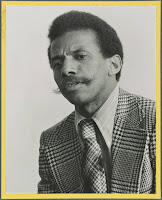Starting a conversation about a topic that was once taboo often requires a few brave voices to break the silence before the more hesitant ones join in. I was surprised to find that in the 1970s and 80s, gay Dartmouth students had a prominent voice on their side: Dean of the Tucker Foundation, Warner Traynham.
Throughout 1978 and 1979, Dean Traynham published several broadsides about issues that were
 relevant at the time. One, entitled "Sexuality and Homosexuality: Some Thoughts," makes a thorough, four-page case that gay people should not be condemned on a religious, legal, or scientific basis. Traynham points out that "condemnation of male homosexuality and the subordination of women go hand in hand in patriarchal societies," and that "[t]here is no clear evidence that there is anything about a sexual orientation toward a person of the same gender that impedes the healthy development of an individual or endangers society." He concludes that "for those who know they are gay and accept it, no apologies are necessary." This sentiment was an incredible display of support for the time, and even more meaningful coming from a religious leader.
relevant at the time. One, entitled "Sexuality and Homosexuality: Some Thoughts," makes a thorough, four-page case that gay people should not be condemned on a religious, legal, or scientific basis. Traynham points out that "condemnation of male homosexuality and the subordination of women go hand in hand in patriarchal societies," and that "[t]here is no clear evidence that there is anything about a sexual orientation toward a person of the same gender that impedes the healthy development of an individual or endangers society." He concludes that "for those who know they are gay and accept it, no apologies are necessary." This sentiment was an incredible display of support for the time, and even more meaningful coming from a religious leader.However, Dean Traynham did not limit this public support to writing his own views on gay rights. The Tucker Foundation hosted several open conversations about gay issues while they were still largely controversial. In the summer of 1976, the Tucker Foundation held a panel on "sexual values on college campuses." Traynham intentionally included a gay speaker on the three-person panel, noting that while the others would be professional ethicists, "there are relatively few professional ethicists to represent the perspective of gay people." He also notes that at the time, Dartmouth was the only Ivy League college that had not yet formed a gay student group, and that he hoped the panel would "provide a context for addressing it."
It was not long before Dartmouth did have its own Gay Student Support Group (GSSG), but it is unclear how much Dean Traynham and the Tucker Foundation directly supported the GSSG. The first time the organization is listed in a Council on Student Organizations (COSO) report is for the 1978-79 academic year (after it had already changed its name to the Gay Students Association), and it may have received funding from the Tucker Foundation in the meantime; an article in The Dartmouth about the group’s beginnings names the Tucker Foundation as the only alternative to COSO for funding. In any case, Stuart Lewan, who organized the GSSG, called the Tucker Foundation the group’s "administrative home." Clearly, the Tucker Foundation was a place where gay students felt comfortable.
I have personal experience advocating for the trans community at present-day Dartmouth, and trans students are usually alone in raising issues that affect us. Because we’re such a small population and so few of us are able and willing to speak out, it is hard to be heard in a campus culture that, for the most part, is ignorant of trans people’s needs. I took an interest in Dean Traynham and the Tucker Foundation’s support for gay rights not only because they supported gay rights, but because the way Traynham showed that support was remarkable. He not only publicly expressed his views, but intentionally created spaces where gay people could speak for themselves. In the words of Lewan, "he walked the walk," and his efforts succeeded in amplifying the conversations about gay issues beginning at Dartmouth.
To read "Sexuality and Homosexuality: Some Thoughts," ask for D.C. History HN51.D37. For access to Dean Traynham’s chronological correspondence, request DA-114, Box 3703.
Posted for Valen Werner ’20, recipient of a Historical Accountability Student Research Fellowship for the 2020 Spring term. The Historical Accountability Student Research Fellowships provide full funding for a current Dartmouth student to conduct research with primary sources during an off-term on a topic related to issues of inclusivity and diversity in the college’s past. For more information, visit the fellowship’s website.
***
All References:
• Broadsides: DC Hist HN51.D37
• Panel: DA-114 Box 3703, Chronological files 1976
• Stuart Lewan’s SpeakOut interview
• DA-8 Box 2626, COSO 1979-80
• The Dartmouth January 31, 1978; page 7

